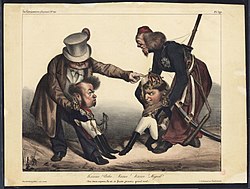In the history of Portugal, a Miguelist (Portuguese: Miguelista) is a supporter of the legitimacy of the king Miguel I of Portugal and his descendants.

Miguel was regent for his niece Queen Maria II of Portugal, and potential royal consort. However, he claimed the Portuguese throne in his own right on the grounds that the "Fundamental Laws of the Kingdom" deprived his elder brother Pedro IV of his right to reign (and of any right of Pedro's daughter to inherit the kingdom from her father) when Pedro became sovereign of the former Portuguese colony of Brazil and launched war on Portugal to oust Miguel as a usurper.
This overall led to a political crisis, during which many people were killed, imprisoned, persecuted or sent into exile, culminating in the Portuguese Liberal Wars between authoritarian Miguelists (led by Miguel) and progressive Constitutionalists (led by Pedro).
In the end, Miguel was forced from the throne and lived the last 32 years of his life in exile.
Miguelism is based not only on the premise that Miguel and his line have legitimate right to the Portuguese throne, but also on defense of the traditional principles of a conservative monarchy based in Catholic values and in the power of the king above the Constitution, in contrast to the Enlightenment values.
Miguelist Braganzas
editKing Miguel I was exiled following the Convention of Evora-Monte (1834), which put an end to the Liberal Wars. The throne was retaken by his niece, Queen Maria II, and a liberal regime was installed.
In exile, the former king married a wealthy Bavarian princess, Adelaide of Löwenstein-Wertheim-Rosenberg. This marriage was the origin of the new Miguelist branch of the Braganzas and their descendants include not only the current claimant to the Portuguese crown, as well as the monarchs of Belgium, Luxembourg, Liechtenstein, and other claimants to former European monarchies (Habsburg, Habsburg-Este, Savoy, Wittelsbach, Bourbon-Parma, Mecklenburg-Strelitz, Karađorđević).
Finally, this Miguelist branch became the sole Braganza representative when King Manuel II of Portugal (the last male Braganza from the senior liberal branch) died without issue, leaving his Miguelist cousin Duarte Nuno as his closest legitimate Portuguese relative. Also Maria Pia of Saxe-Coburg and Gotha Braganza, who claimed to be the illegitimate daughter of King Carlos I of Portugal, claimed the right to the titles of Duchess of Braganza and to be the rightful Queen of Portugal.[2]
Miguelist claimants to the throne
edit| Claimant | Portrait | Birth | Marriages | Death |
|---|---|---|---|---|
| Miguel I 1834–1866 |
26 October 1802, Lisbon son of João VI and Carlota Joaquina of Spain |
Adelaide of Löwenstein-Wertheim-Rosenberg 24 September 1851 7 children |
14 November 1866 Esselbach aged 64 | |
| Miguel, Duke of Braganza 1866–1920 |
19 September 1853, Kleinheubach son of Miguel I and Adelaide of Löwenstein-Wertheim-Rosenberg |
Elisabeth of Thurn and Taxis 17 October 1877 3 children Maria Theresa of Löwenstein-Wertheim-Rosenberg 8 November 1893 8 children |
11 October 1927 Seebenstein aged 74 | |
| Duarte Nuno, Duke of Braganza 1920–1922 (Miguelist claimant) 1932–1976 (Royalist claimant) |
23 September 1907, Seebenstein son of Miguel, Duke of Braganza and Maria Theresa of Löwenstein-Wertheim-Rosenberg |
Maria Francisca of Orléans-Braganza 15 October 1942 3 children |
24 December 1976 Lagoa aged 69 | |
| Duarte Pio, Duke of Braganza 1976–present |
15 May 1945 Bern son of Duarte Nuno, Duke of Braganza and Maria Francisca of Orléans-Braganza |
Isabel, Duchess of Braganza 13 May 1995 3 children |
Genealogical chart
editOn the family tree below, the Miguelist branch is clearly identified on the right-hand side while the Liberal Branch from Maria II is on the left with the Brazilian Imperial branch descending from her brother Pedro II in the middle. In 1942 the Miguelist pretender Duarte Nuno of Braganza married Maria Francisca de Orléans e Bragança, a great-granddaughter of Pedro II of Brazil. The current pretender Duarte Pio, Duke of Braganza, is therefore descended from both of the feuding brothers Pedro IV of Portugal and Miguel I of Portugal.
| John VI [1767–1826] King of the United Kingdom of Portugal, Brazil & the Algarves 1816–22 King of Portugal & the Algarves 1822–26 Titular Emperor of Brazil 1825–26 | |||||||||||||||||||||||||||||||||||||||||||||||||
| Pedro I of Brazil and IV of Portugal [1798–1834] Emp. of Brazil 1822–31 King of Portugal 1826 | Miguel I [1802–1866] Regent (to his niece) 1828 King of Portugal 1828–34 | ||||||||||||||||||||||||||||||||||||||||||||||||
| Maria II [1819–1853] Queen of Portugal 1826–28, 1834–53 | Fernando II [1816–1885] Prince of Saxe-Coburg and Gotha Prince Consort 1836–37 King Consort 1837–53 | Pedro II [1825–1891] Emp. of Brazil 1831–89 Imperial claimant 1889-91 deposed (1889) | |||||||||||||||||||||||||||||||||||||||||||||||
| Pedro V [1837–1861] King of Portugal 1853–61 | Luis I [1838–1889] King of Portugal 1861–89 | Isabel, Princess Imperial [1846-1921] Imperial claimant 1891-1921 | Miguel (II) [1853–1927] | ||||||||||||||||||||||||||||||||||||||||||||||
| Carlos I [1863–1908] King of Portugal 1889–1908 | Luís, Prince Imperial [1878-1920] | Pedro de Alcântara [1875-1940] Petrópolis claimant 1921-40 (post mortem only) | |||||||||||||||||||||||||||||||||||||||||||||||
| Manuel II [1889–1932] last King of Portugal 1908–10 deposed (1910), without issue | Pedro Henrique [1909–1981] Vassouras claimant 1921-81 | Pedro Gastão [1913–2007] Petrópolis claimant 1940-2007 | Maria Francisca, Duchess of Braganza [1914-1968] | Duarte Nuno [1907–1976] | |||||||||||||||||||||||||||||||||||||||||||||
| Brazilian Imperial family (Vassouras) | Brazilian Imperial family (Petrópolis) | Duarte Pio [born 1945] Duke of Braganza | |||||||||||||||||||||||||||||||||||||||||||||||
See also
editReferences
edit- ^ "Civil war - With fire and Sword". Portuguese Court of Audits. Retrieved 17 March 2021.
- ^ Jean Pailler; Maria Pia of Braganza: The Pretender. New York: ProjectedLetters, 2006.